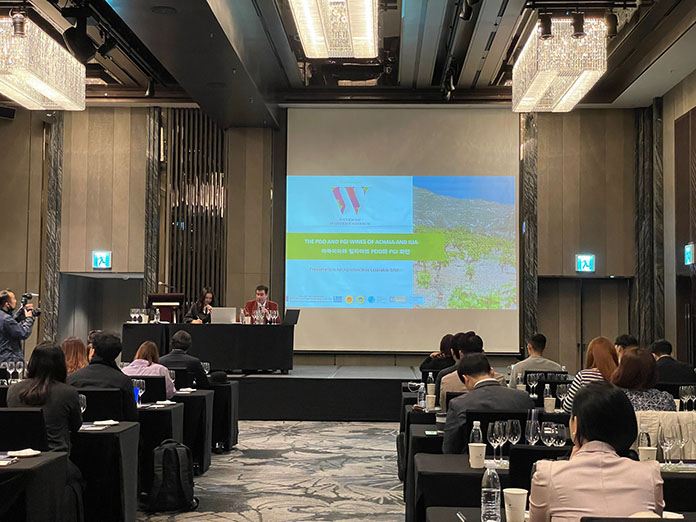South Korea, one of the fastest growing developed countries in the world and the 10th largest economy in the world (4th in Asia) is a dream market for every food exporter, since Koreans tend to spend more on nonessential food items, are adopting a western-style and diet which opens the door for popular European products and consider prices in general as less of a problem than in other Asian countries. Mr. Konstantinos Daskalopoulos, Counsellor, Head of the Office for Economic & Commercial Affairs at the Greek Embassy in Seoul talks to Ambrosia Magazine about Greek f&b businesses’ significant challenges to systematically attempt to enter the promising South Korean market.
Interview: Charitomeni Vonta
What would you say is the greatest asset of Greek f&b products in your market?
South Korea’s economy is a highly developed, mixed economy. Based on nominal GDP, it has the 4th largest economy in Asia and the 10th largest in the world. South Korea stands out for its impressive economic growth from an underdeveloped nation, after a war conflict that destroyed every infrastructure and social fabric of the country, to a developed, high-income country in just a few decades, that is, 3 generations. This economic growth has been described as the miracle on the Han River, which allowed it to join the OECD and the G-20. South Korea remains one of the fastest growing developed countries in the world after the COVID-19 downturn with a pivotal position for the future of the global economy.
South Korea’s economy is a highly developed one: The Free Trade Agreement between the EU and South Korea has had a very positive impact on trade in services. The increase in bilateral trade in goods and investment has resulted in increased demand for specialized cross-border services and the expansion of trade in services.
The fact remains that Greece is number three behind Italy and Spain in olive oil production. Knowing this, the members of ESVITE must find effective ways to remain competitive with the goal to increase exports in key markets. To get there, we all have to work together and overcome some unique challenges.
According to Hellenic National Statistical Service (ELSTAT) data, it can be observed that over time the trade balance between the two countries is consistently negative for Greece. According to the individual trade flows by product (CN4) ship imports from South Korea to Greece and petroleum imports from South Korea characterize the size of trade flows in the period 2000-2023. In the years 2014 and the two years 2020-2021 the trade balance became surplus in favor of Greece.
It is noteworthy that over time no significant commercial flow of exports of the basic Greek food products has been recorded, i.e. codes 0302, 0305 which are fresh and preserved fish, 0403, 0406 cheese, 1509 olive oil, 070992 olives. Since 2013, they have started to record significant export flows in the category 2008-fruits which amounted to €3.6 million in 2021, since kiwis have shown a miracle growth in the export rate that is quite promising.
The first 10 exported products include timeless industrial products (shipbuilding items, plates, mechanical parts) but also construction industry products. According to data from the South Korean Customs Service, Greece achieved the best export performance in terms of trade flows in 2021, exceeding $1.3 billion, ranking 45th among the 242 countries that exported goods to South Korea. Greece gradually increased its share from 0.019% of all imports to S. Korea to 0.2% in 2021.
In the period 2010-2022, the Korean economy registered a 176.7% increase in its imports as from $160.4 billion in 2010 it imported products worth $734 billion in 2022. Obviously, the Greek export flows to S. Korea could not find a stable reference point in the Korean market during this time and in fact the major share continued to concern the exports of petroleum products.
Our main competitors in the EU with the entry into force of the Free Trade Agreement have registered a steady increase in their percentages and in sectors of our interest there is a substantial presence. This is not the case with Greek products, as there seems to be no continuity in the attempts to enter the South Korean market.
It is noteworthy that in the period 2010-2022 olive oil imports in South Korea increased by 25%, wines by 39%, olives by 17% and dairy products by 38%. Greece has had a negligible share in the import boom in these product categories which are highly competitive in other important markets. Only dairy products show a significant increase in the last two years (4.8%), which is limited to yogurt.
There are therefore extremely significant challenges for Greek businesses to systematically attempt to enter the promising South Korean market.
Which Greek products have the greatest potential, and how could their dynamics improve?
South Korea’s strong economy with high per capita purchasing power and dependence on food imports make the country an extremely attractive prospect for global food exporters.
The Korean food market is currently influenced by a number of trends that shape consumer demand. The population is adopting a western-style and diet which opens the door for popular European products. The global organic trend that focuses on high-quality products with multiple health and wellness benefits also has an increasing following among young professionals and the older population who tries to stay fit. Price is less of a problem than in other Asian countries and the Koreans tend to spend more on nonessential food items.
Meat
Meat imports (both fresh and frozen) are on a growing trend, especially pork and beef. Pork products are gaining an increased popularity among the consumers and frozen pork is the most important category among the frozen food imports. Some of the most important sources of pork are the United States, Germany and Chile.
Beef imports have also reached record levels last year following an explosive 300% since 2005. Korea imported beef 1.81 billion USD worth from Australia, New Zealand, Canada and a few South American countries, especially Uruguay.
Chocolate, snacks & biscuits
Korean imports of various snack products, cookies and biscuits are on a constant increase since 2005 (more than 290% to a total of almost 122 thousand metric tons).
Recent statistics also show promising results for chocolate and an excellent opportunity for foreign chocolate producers – imports grew by 200% since 2000 when the total imports were around 15,500 tons. Koreans prefer chocolate products from the United States, Belgium, Germany, Italy, France of China.
Fresh food – nuts & fruit
The consumption of fresh food products is growing slowly but steadily, influencing the country’s imports for these commodities. Nuts and fresh fruit imports (used for juices) are the most promising and should be taken into consideration by Greek Exporters.
Cheese
Cheese is gaining attention from Korean consumers who have become accustomed to the product thanks to western dishes like pizza, lasagna, etc. Cheese imports have increased dramatically in the last decade and are now close to the 700 million $ barrier. The country imports mostly fresh cheese (mozzarella, cream cheese), but also other varieties that can be used as a topping.
Other food products
Ready-to-eat or convenience foods were the top food/ beverage products shipped in South Korea in 2021, with over 4.21 trillion South Korean won worth of products shipped. Sauces came in second at around 3.66 trillion South Korean won in value.
What is the biggest challenge for companies or brands who want to do business in your country?
South Korea has an unusually large percentage of urban population, about 80%, and a strong food retail ecosystem, which relies on specialized importers and distributors. Hypermarkets hold close to 45% of the market share and are the main channel for imported food products. The most important names are Homeplus, E-mart, Costco and Lotte Mart. The Office for Economic & Commercial Affaires of the Greek Embassy is in direct contact with the main players and boosts efforts to reach out to prominent Greek products to be included in these big players in the Korean market.
As many Koreans live busy lives and focus on their careers, online shopping is also significantly more developed than in other Asian countries and many retailers have a strong online presence.
Even if Korea is considered a country where exporters are met by a friendly system that facilitates trade, Greek exporters interested in the food market should make sure that they comply with the country’s import regulations.
In order to enter the Korean market, producers should make sure that they are supported by a reliable food importer who will guide them and provide vital market information, as well as customs clearance and promotion is many cases. Agents (offer agents) can also be an alternative.
Marketing strategies should also be discussed with the importer, as well as short- and long-term plans that will allow the development of a solid relationship. Exclusivity shouldn’t be a problem as it’s not a very usual demand in Korea. Importers can be met via various strategies, among them cold contacting via a reliable list, taking part at the major food expos, like Seoul Food and Hotel or being recommended by a government or trade agency. After the initial contact, producers can send the food importer various marketing materials, like product brochures and samples, as well as detailed price lists.
Finally, after these steps, exporters should focus on personal visits which are very important for companies who want to succeed in Korea. Business meetings and dinners with the contacts help create trust and develop communication.
What are the targeted actions taken to improve the position of Greek f&b products / to enhance exports to your market?
The main trade flow between Greece and S. Korea throughout time is the export of ships, as Greek shipowners have consistently chosen for 50 years to build their ships in Korean shipyards. In the years 2000-2022 alone, Korean shipyards built ships worth $28.6 billion for Greek shipowners. This bond between Greece and Korea is already 50 years old and sets the tone for bilateral economic relations. Marine equipment companies therefore have significant potential to export their high-tech products to Korean shipyards, which consistently hold the second place worldwide in new shipbuilding orders.
In the context of promoting cooperation with South Korean shipyards, the Greek Embassy and the Office of Economic Affairs succeeded in promoting a decision to include a Greek company in a Research and Development program promoted by the South Korean government to upgrade old technology ships to eco-friendly. We seek to further organize this effort to include many more Greek companies active in the shipping-maritime sector.
In the last two years an effort has been undertaken by some Regions of Greece to promote wine products in S. Korea. This initiative has generated particular interest, and the resulting capital gains are already creating optimism for the prospects of increasing the presence of Greek wines in the South Korean market.
What are the prospects of Greek f&b products in your market?
We must consider the characteristics of trade between South Korea and the EU. South Korea has seen a sharp rise in the imports of premium food products. Τhe fact that in the last 10 years the imports into Korea of wine, olive oil, olives, snacks, dairy products, dried fruits have formed stable flows from Greece’s main competitors in the EU, shows the way for the effort that must be made by the Greek companies.
The Office for Economic and Commercial Affairs is active in a multi-level role to connect Greek entrepreneurship with South Korean, as the energy, high technology, shipbuilding sectors have already created important partnerships. The promotion of Greek food is now an important goal that requires a systematic approach and of course the organization of participation in important exhibitions in South Korea in which Greek businessmen will have the opportunity to meet the large distributors who will undertake to import the known quality Greek products.
Greek Embassy in Seoul, South Korea
27th fl. Hanwha Bldg. 86 Cheonggyecheon-ro, Jung-gu, Seoul
Tel: +82-2-729-1397
Email: ecocom-seoul@mfa.gr


















 Mr. Konstantinos Daskalopoulos, Counsellor at the Greek Embassy in Seoul
Mr. Konstantinos Daskalopoulos, Counsellor at the Greek Embassy in Seoul Snapshot from the promotional event of Greek wines from the Regions of Attica and Western Greece1
Snapshot from the promotional event of Greek wines from the Regions of Attica and Western Greece1
